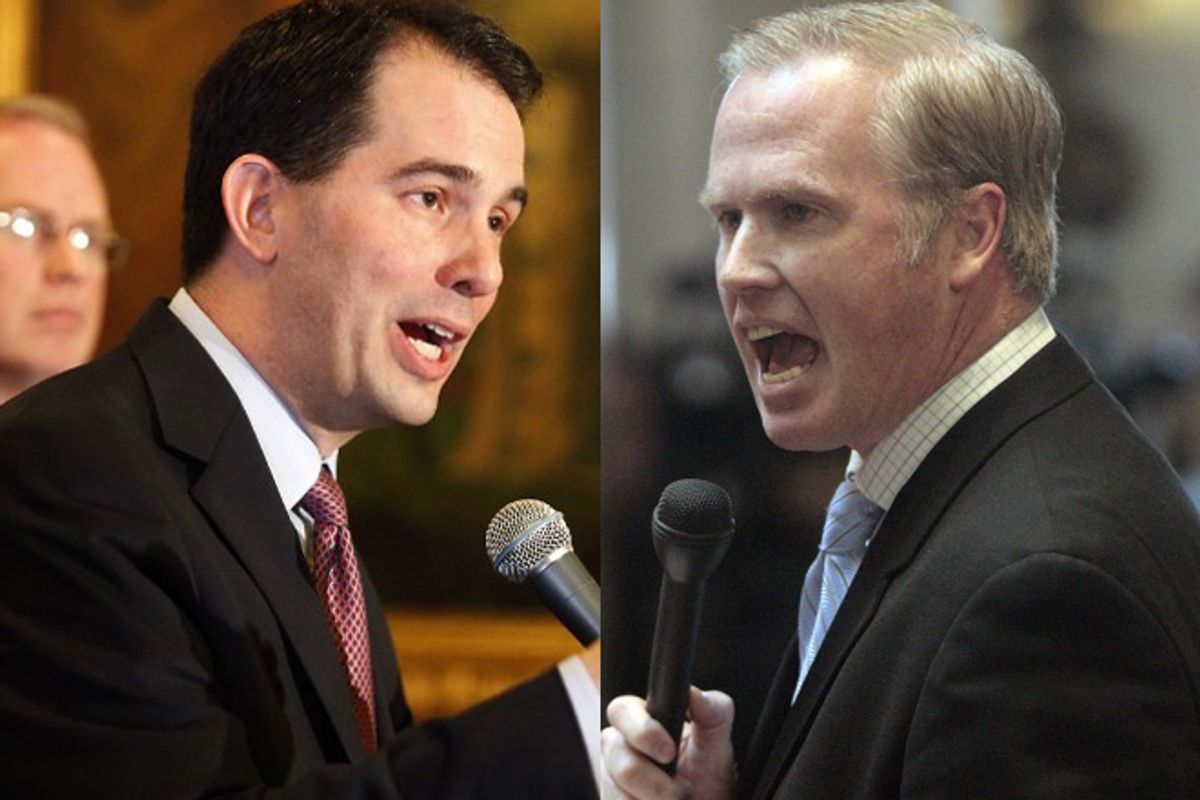Does Scott Walker want to make Wisconsin a right-to-work state? He says no. But his allies are gunning for it.
In a new video, the speaker of the Wisconsin Assembly says his caucus wanted to pass a right-to-work bill last year. The video, shot on March 27 of this year by a Democratic Party tracker, who provided the footage to Salon, captures Speaker Jeff Fitzgerald talking at a bar with a reporter from the Milwaukee Journal-Sentinel.
The reporter asks Fitzgerald whether he was surprised when Walker described his plans to attack public workers’ collective bargaining. “No, it wasn’t a shock to me …” responds Fitzgerald. “My caucus wanted to go further. I had people in my caucus that was, you know, were wondering if we were going to do Right to Work in this state. So to tell you the truth, the collective bargaining, to me, I thought was more of a middle ground if you can believe that.”
Fitzgerald says “a number of people thought” they would push right-to-work, just as Republicans were in Indiana (where it passed this winter) and Minnesota (where it stalled). “When I heard about the collective bargaining,” he says, “it didn’t surprise me at all.” (Fitzgerald did not immediately respond to a request for comment.)
The video of Fitzgerald comes a week after Walker himself was caught on camera in January 2011, saying, "The first step is we’re going to deal with collective bargaining for all public employee unions, because you use divide and conquer.” Taken together, both men's comments suggest the state GOP plans to step up its attacks on organized labor, though publicly Walker has insisted otherwise.
Assembly Speaker Fitzgerald, and his brother Scott, the majority leader in the Senate, are two of Walker’s closest political allies. When they helped push through Walker’s collective bargaining bill last year, critics charged that Wisconsin had become “Fitzwalkerstan.” He’s also the front-runner in a hotly contested GOP primary for U.S. Senate – perhaps the reason he’s talked up right-to-work even though Walker is trying to tamp down the topic.
Contacted over email regarding the video, Walker spokesperson Ciara Matthews responded that Walker “has made clear repeatedly that he does not have an interest in pushing Right to Work legislation.”
The Democratic Party of Wisconsin, having recorded the video, was quick to try to turn it against Walker. Calling the video “shocking,” Wisconsin Democratic Party communications director Graeme Zielinski said it offers further evidence that Walker “does not tell the public honestly what his plans are because they would reject them.” Referring to Fitzgerald, Zielinski said, “This is the guy who has carried water for Scott Walker like nobody else.”
A so-called right-to-work bill bans union contracts that require workers represented by unions to pay for the costs of that representation. By leaving unions stuck representing some workers for free, it saps them of resources to grow or defend themselves. By ending union membership as the default in union workplaces, it makes it easier for management to discriminate against union members.
Since the recall effort picked up steam, Walker has been downplaying right-to-work as an issue for Wisconsin. Walker, who co-sponsored a right-to-work bill as a freshman legislator in 1993, told the Atlantic in February that he had no plans to push the issue and that “Private sector unions had been our partner in the economic revival we’ve had in this state.” At the time, I noted that Walker was trying to walk a fine line: stoking resentment against supposedly overpaid public employees while working to shed the anti-union label. As Steve Kornacki wrote, that became even more difficult last week, after the video of Walker was released.
Watching that video, it’s not a stretch for private sector union members – who swarmed the capitol last year in defense of their public sector counterparts – to imagine Walker would like to conquer them next. The day after the video came out, Walker told reporters that right-to-work “isn’t going to get to my desk. I’m going to do everything in my power to make sure it isn’t there …” But he declined to say whether he would sign it. While today’s new video doesn’t mention Walker’s stance on right-to-work,” it offers further evidence of Walker allies salivating over it, and it undermines his efforts to render it a non-issue. Citing two attendees, Blogging Blue reported that GOP Assembly Member Chris Kapenga told constituents at a listening session last night that Republicans “have Right to Work legislation ready to go” and just “have to wait until it is politically feasible.”
If Walker survived the recall and signed a right-to-work bill after disclaiming any interest in it, he wouldn’t be the first. Fellow Republican rock star, Indiana Gov. Mitch Daniels, ended public workers’ bargaining just after being elected, claimed to have no interest in right-to-work, got reelected and then pushed and signed Indiana’s bill this year.
Could that history repeat itself in Wisconsin? That depends not just on who wins the recall races for governor and Senate, but on how much they win by and what lessons their colleagues take from the results. But today’s video reinforces what many Wisconsin voters on both sides likely suspect: The question isn’t whether Republican leaders want to bust unions, it’s just what they think they can get away with.



Shares